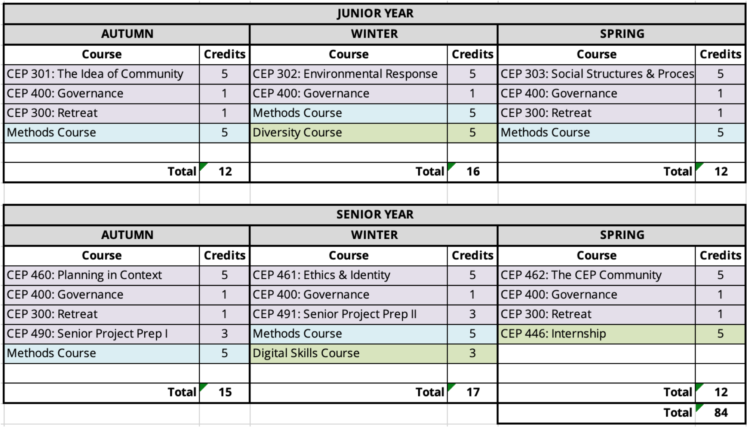Example Course Schedule

Pre-Major
Core Courses


Senior Year, Autumn Quarter
5 credits, I&S
Examines theory against backdrop of practice for broad historical understanding of social, political, and environmental planning. Critique from viewpoints, e.g., planning history, ethics, ecofeminism, environmental justice, class and capitalism, planning, and global economy.
Methods Courses
Alongside your core courses, you will take 25-credits of Methods courses. Methods are broadly defined in CEP as classes that provide ways of knowing, ways of thinking, or ways of doing. You should select your Methods courses based on your stated educational goals. Methods courses must be upper-division (300-level or above). They are chosen with intention each quarter, and are unique to every student.
Appropriate Methods courses include:
- Qualitative methods (interviews, observations)
- Quantitative methods (surveys, statistics)
- Research design methods
- Design, visual analysis, and communication
- Symbolic or discursive interpretation or analysis
- Critical theory
- Computer applications and modeling
- Group dynamics
- Facilitation and leadership
- Ethics and philosophy
- Theory and methods of organizational change
- Processes of communication
- Specialized writing
Other Required Courses
Student-Led
Junior & Senior Year; Autumn & Spring Quarters
1 credit
Opportunities for community building and all-major policy deliberation and decisions. Workshops for skill-building in consensus, facilitation, and for major-specific activities such as policy deliberation and developing individual study plans.
Student-Led
Junior & Senior Year; Autumn, Winter & Spring Quarters
1 credit
Emphasizes personal and collective leadership, democratic decision-making, and learning through direct action and reflection.
Junior or Senior Year; Autumn or Spring Quarter
5 credits
Connects core and individual courses with field work.

Senior Year, Autumn Quarter
3 credits
Supports the conceptualization and planning of senior project/capstone work including selecting a project, beginning a literature review, finding a mentor, and developing a plan.

Senior Year, Winter Quarter
3 credits
Focuses on implementing the senior project/capstone, including revisions and updates as seen fit.
Junior or Senior Year; Autumn, Winter, or Spring Quarter
5 credits
Each student must take at least 5 Diversity credits, in place of the UW standard of 3 Diversity credits. You can read more about what constitutes a Diversity course below.
Junior or Senior Year; Autumn, Winter, or Spring Quarter
3 credits
CEP students must take at least 3 credits of courses that focus on digital technology and its practical and theoretical roles in the modern world.
CEP Electives
Spring Quarter
5 credits, VLPA/I&S
Uses digital technologies for mapping, drafting, modeling, and communication. Includes real-world case study projects that focus on urban design and planning issues.

Autumn, Winter & Spring Quarters
5 credits, I&S
This practicum brings together multiple planning elements within the context of a real-world problem. Students will explore planning and design at the city, neighborhood, and site scale.




